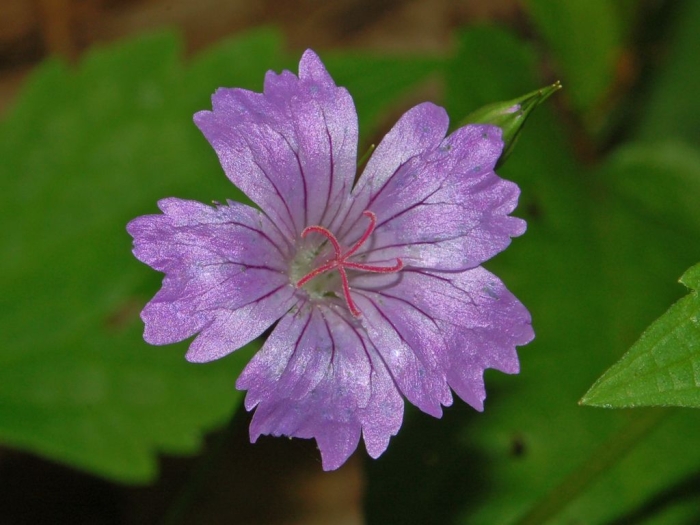Knotted Crane’s-Bill
(Geranium nodosum)
Knotted Crane’s-Bill (Geranium nodosum)
/
/

Hectonichus
CC BY-SA 3.0
Image By:
Hectonichus
Recorded By:
Copyright:
CC BY-SA 3.0
Copyright Notice:
Photo by: Hectonichus | License Type: CC BY-SA 3.0 | License URL: https://creativecommons.org/licenses/by-sa/3.0 | Uploader: Hectonichus | Publisher: Wikimedia Commons | Title: Geraniaceae_-_Geranium_nodosum-1.JPG | Notes: |
























































Estimated Native Range
Summary
Geranium nodosum, commonly known as Knotted Crane’s-bill, is a perennial herb native to the understory of deciduous forests in Southern and Central Europe. It is a shade-tolerant species that thrives in the dappled light beneath tree canopies. This plant typically reaches 20–30 centimeters (7.9–11.8 inches) in height, with a maximum of 50 centimeters (20 inches). The upright, slender, branched, and hairy stems support leaves that are dark green and hairless on the upper surface, with a lighter green and hairy underside. The lilac to violet obovate petals of the flowers are borne on long stalks, and the plant blooms from June through August, with flowers that are attractive to insects for pollination. In the winter, Knotted Crane’s-bill retreats to its rhizome, surviving the cold months without aboveground herbage.
Knotted Crane’s-bill is valued for its low maintenance and ability to flourish in shaded conditions, making it an excellent ground cover for woodland gardens, shaded borders, or naturalized areas. It requires medium amounts of water and can adapt to a range of soil drainage conditions. While it prefers moist, well-drained soils, it is quite adaptable and can tolerate drier conditions once established. Gardeners should be aware that in some conditions, it can spread vigorously, potentially becoming invasive. However, its non-aggressive nature generally makes it a welcome addition to the garden.CC BY-SA 4.0
Knotted Crane’s-bill is valued for its low maintenance and ability to flourish in shaded conditions, making it an excellent ground cover for woodland gardens, shaded borders, or naturalized areas. It requires medium amounts of water and can adapt to a range of soil drainage conditions. While it prefers moist, well-drained soils, it is quite adaptable and can tolerate drier conditions once established. Gardeners should be aware that in some conditions, it can spread vigorously, potentially becoming invasive. However, its non-aggressive nature generally makes it a welcome addition to the garden.CC BY-SA 4.0
Plant Description
- Plant Type: Herb
- Height: 0.5-1.5 feet
- Width: 0.267-0.8 feet
- Growth Rate: Moderate
- Flower Color: Pink, Purple, White
- Flowering Season: Spring, Summer, Fall
- Leaf Retention: Deciduous
Growth Requirements
- Sun: Full Sun, Part Shade, Full Shade
- Water: Medium
- Drainage: Fast, Medium, Slow
Common Uses
Bank Stabilization, Bee Garden, Bird Garden, Butterfly Garden, Deer Resistant, Groundcover, Low Maintenance, Rabbit Resistant, Rock Garden, Salt Tolerant, Showy Flowers
Natural Habitat
Understory of deciduous forests in Southern and Central Europe
Other Names
Common Names: Knopige Ooievaarsbek, Blanknäva
Scientific Names: , Geranium nodosum, Geranium duplicatum, Geranium nodosum subsp. eugeniae, Geranium collinum subsp. freyeri, Geranium collinum var. freyerii, Geranium eugeniae, Geranium eugenii, Geranium nodosum subsp. eugenii, Geranium nodosum var. freyeri,
GBIF Accepted Name: Geranium nodosum L.